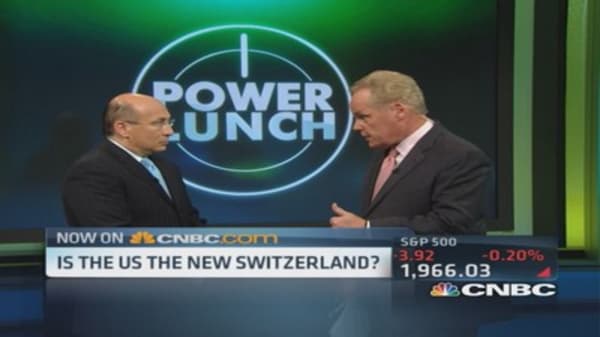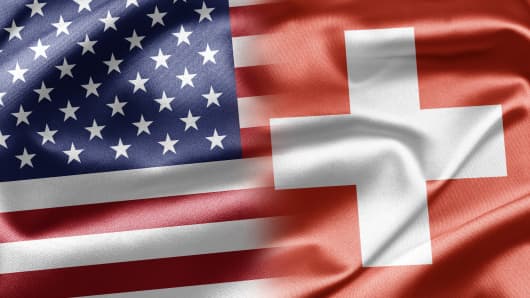I have a somewhat contrarian view of the America's future. Not only do I doubt that the United States is in secular decline, but in some respects, it is gaining in stature as the safest haven for world's vast monetary wealth.
In other words, Fortress America is becoming the modern-day version of Old World Switzerland.
There has been no shortage of Russian, Chinese or Latin American billionaires who are squirreling their money away in the United States, so much so, for instance, that China recently suspended a pilot program that allowed wealthy Chinese officials, both government and military, to move their money out of the country.
Read MoreWealthy Chinese replace Russians as top apartment buyers
Some have suggested that Vladimir Putin doesn't mind the economic sanctions leveled against him of late, as it could force Russian money to come back home.
Capital flight from Russia has become a massive problem, with more money escaping Putin's oligopoly in the first few months of this year than in all of 2013.
Published reports say that $75 billion has escaped Russia in the first six months of this year, already, well above the $62 billion that left last year.
Some economists estimate that if this trend continues, Russia will have EXTERNAL borrowing needs of $120 billion to finance its government. That won't be easy as Moscow faces further sanctions from the West, while its oligarchs are looking, increasingly, to park their money in offshore vehicles, U.S. Treasurys, or New York and Miami real estate.
Even more telling, though, is where the wealthy of the world park their cash. Russian oligarchs, like Roman Abramovich, amid a host of property investments from Knightsbridge to St. Bart's, recently bought a $75 million Manhattan mansion, while the daughter of another Russian oligarch recently plopped down a stunning $88 million for a New York pad while she finished college.
Chinese generals, Russian oligarchs and Brazilian billionaires have been scooping up discounted properties in Miami, creating a real-estate shortage of condos where there was a massive glut only a few short years ago.
China, meanwhile, has purchased $107 billion of U.S. Treasurys in the first half of this year, no doubt in an effort to weaken its currency, which it does by selling yuan and buying U.S. dollars. It parks the proceeds in short-term U.S. debt. But, it comes after a fairly long hiatus in which China shunned U.S. bonds. Despite losing its "AAA" bond rating, every time the world quakes over a geopolitical tremor, the direct beneficiary is the U.S. bond market.
Indeed, of late, bonds have rivaled gold as a place to park cash during periods of political upheaval.
Rather ironically, this comes at a time when the U.S. has a lesser need for external funding itself, making the move all the more helpful to to the U.S. bond market and that much safer for overseas investors to use the U.S. as a safe haven. Despite many predictions to the contrary, overseas investors are not boycotting U.S. bonds … they are buying them.
Read MoreWhy traders are wrong about the Fed: Insana
This clearly suggests that U.S. capital markets remain the deepest, safest and most liquid markets on the planet.
There is no risk of confiscation, a positive real return, and both relative, and absolute, political stability here at home.
Some industry groups have noted that, to date, some 186 new manufacturing facilities, totaling $117 billion in new investment, have broken ground, Of that total, 62 percent is the result of foreign direct investment. The influx of FDI is the direct result of the energy boom going on in the U.S. But the boom alone is not responsible for the surge in foreign direct investment. The economic and political environment count just as much. Investment in some promising emerging markets, rich in natural resources, as well, has begun to dry up, owing to political, or military risks, mounting around the world.
Thus, the U.S. is not just a safe haven for capital flows, but also for investment in new plant and equipment, long-dated investments that will help the U.S. economy grow and prosper in the coming years. That will create a virtuous circle that can lead to more and more capital coming here, and more and more money fleeing other places.
In that regard, the U.S. is becoming MORE attractive than Switzerland. It is not simply a resting place for excess cash — it is a home.





